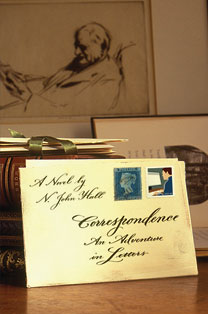Correspondence
A novel in letters breathes life into the great Victorian authors
By Rebecca Rego Barry Rebecca Rego Barry is the editor of this magazine.
Correspondence: An Adventure in Letters
By N. John Hall
David R. Godine, Publisher
238 pages
jacketed hardcover $24.95
With main characters that include a collector (though he might not know it yet), an auction house employee, a manuscripts dealer, a nineteenth-century bookseller, and the most famous Victorian authors, Correspondence seems a perfect fit for readers of this magazine. It is by turns suspenseful and funny, and overall, enjoyable. There are two central relationships to follow—one between Larry Dickerson, a retired bank clerk in New York City who has inherited a great stash of manuscripts, and Stephen Nicholls in the manuscript department at Christie’s of London; the other between Dickerson’s great-great-grandfather, Jeremy MacDowell, and a list of Victorian England’s greatest authors, including Dickens, Thackeray, Butler, Hardy, Eliot, and Trollope.
It is a fully epistolary novel, so we have (mostly) emails between Dickerson and Nicholls as Dickerson navigates the world of high-end auctions, revealing little by little what he’s got—109 letters from famous Victorians, and about the same amount in copies of outgoing correspondence penned by his ancestor, a bookseller on Paternoster Row. He’s in no hurry to Xerox the lot and let Christie’s put it up for sale. Not yet. Instead, he begins a yearlong journey into the letters, transcribing them and attempting to understand the culture and politics of the writers’ lives.
John Hall, who makes his fiction debut with Correspondence, is in fact an expert in Victorian literature. He is a professor of English at Bronx Community College and the Graduate Center of the City University of New York, and he knows his Trollope, having written several scholarly books on him. So it is perhaps easy to understand that it is in the imagined letters of the nineteenth-century bookseller, posing questions to his Victorian compatriots about book illustration styles and favorite works of literature, and the responses he receives, that Hall brings his readers somewhere new and interesting. He has Dickens writing, “My favourite among my works is David Copperfield. I think the reason is the partly self-portrait I put into the chief character. And yes, there is something of yours truly in Pip in Great Expectations, also; but then there is a good deal of the author in every character he creates…” Samuel Butler writes to him, “I read about half of Middlemarch and hated it.” Thackeray scribbles a frowning self-portrait when writing to MacDowell about bad reviews.
Correspondence is reminiscent of 2008’s popular The Guernsey Literary and Potato Peel Pie Society, also an epistolary novel about historic literary manuscripts, and like that novel, it has a flippancy about it that makes it difficult to love, particularly if you’re the kind of bibliophile-reader who puts A. S. Byatt on a pedestal. Larry Dickerson—with his blockheaded New Jerseyisms—and Stephen Nicholls—with his “English reserve” and better vocabulary—fail to leap off the page. That said, what Correspondence lacks in character development, it makes up for with its illuminating depiction of the Victorians (their letters are certainly hardier). And besides, it is a rare enough phenomenon to have a literary novel about manuscripts, dealers, and auctions appear that its troubles are worth overlooking.








